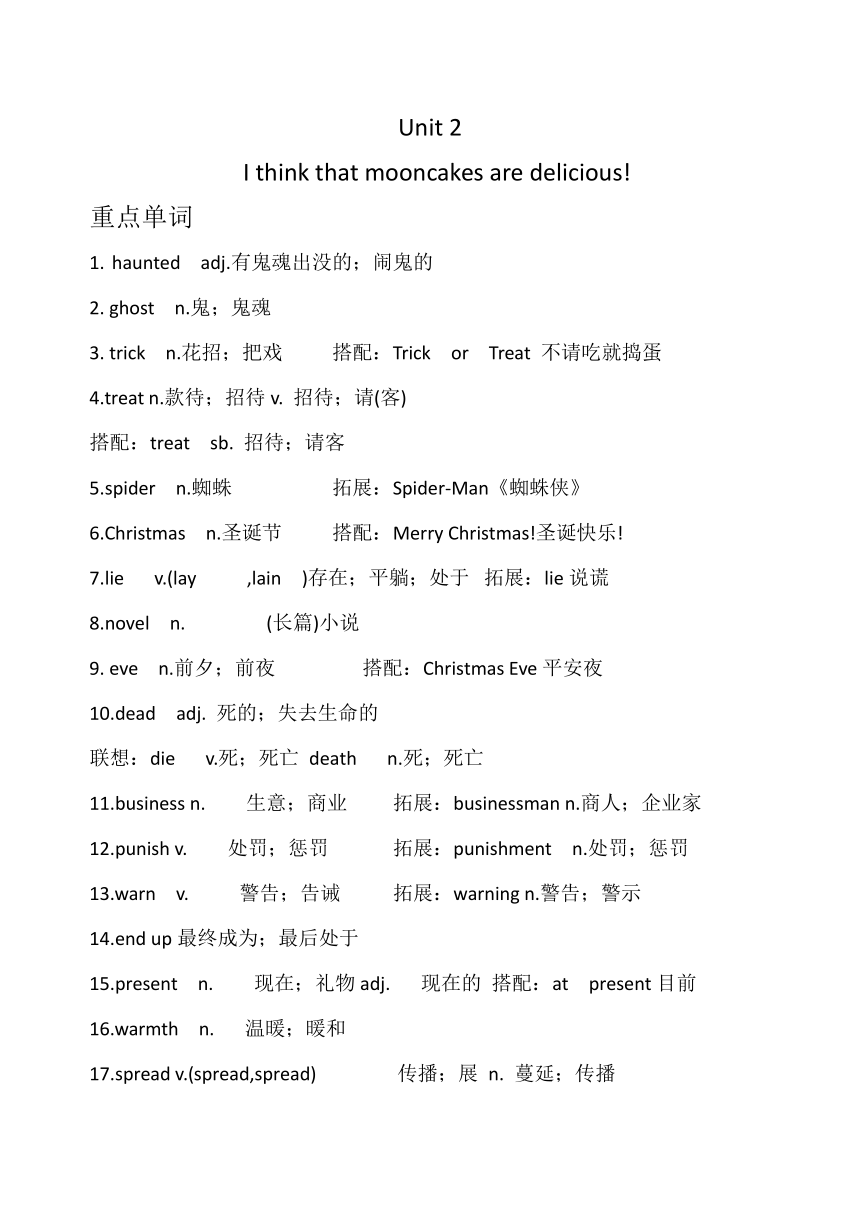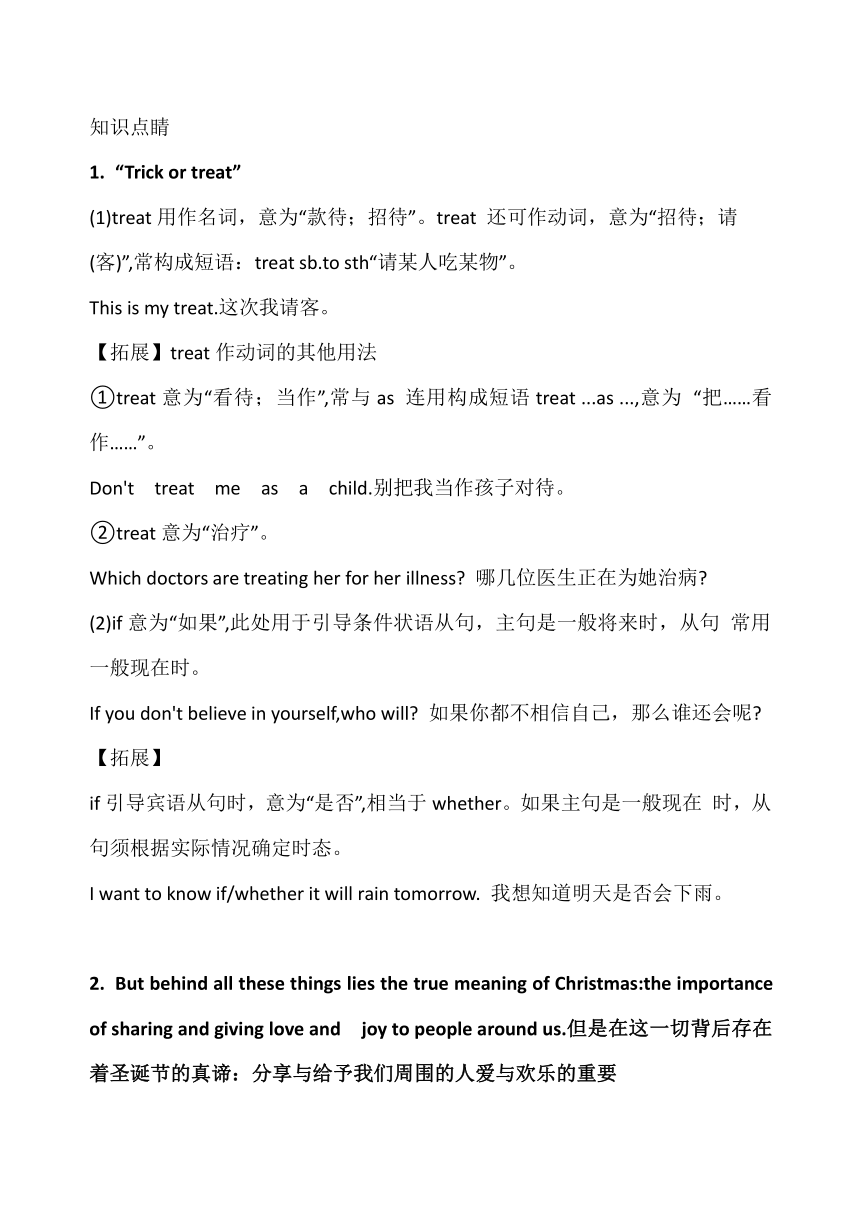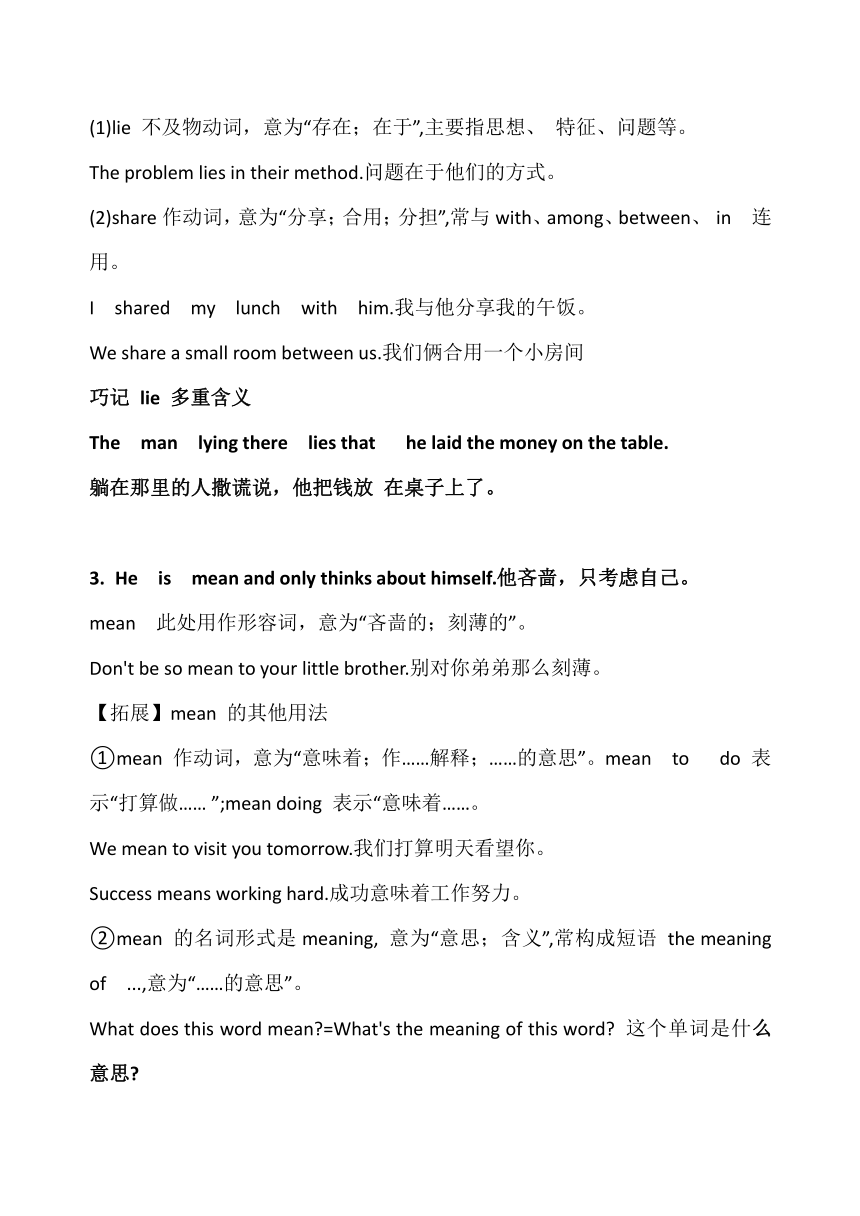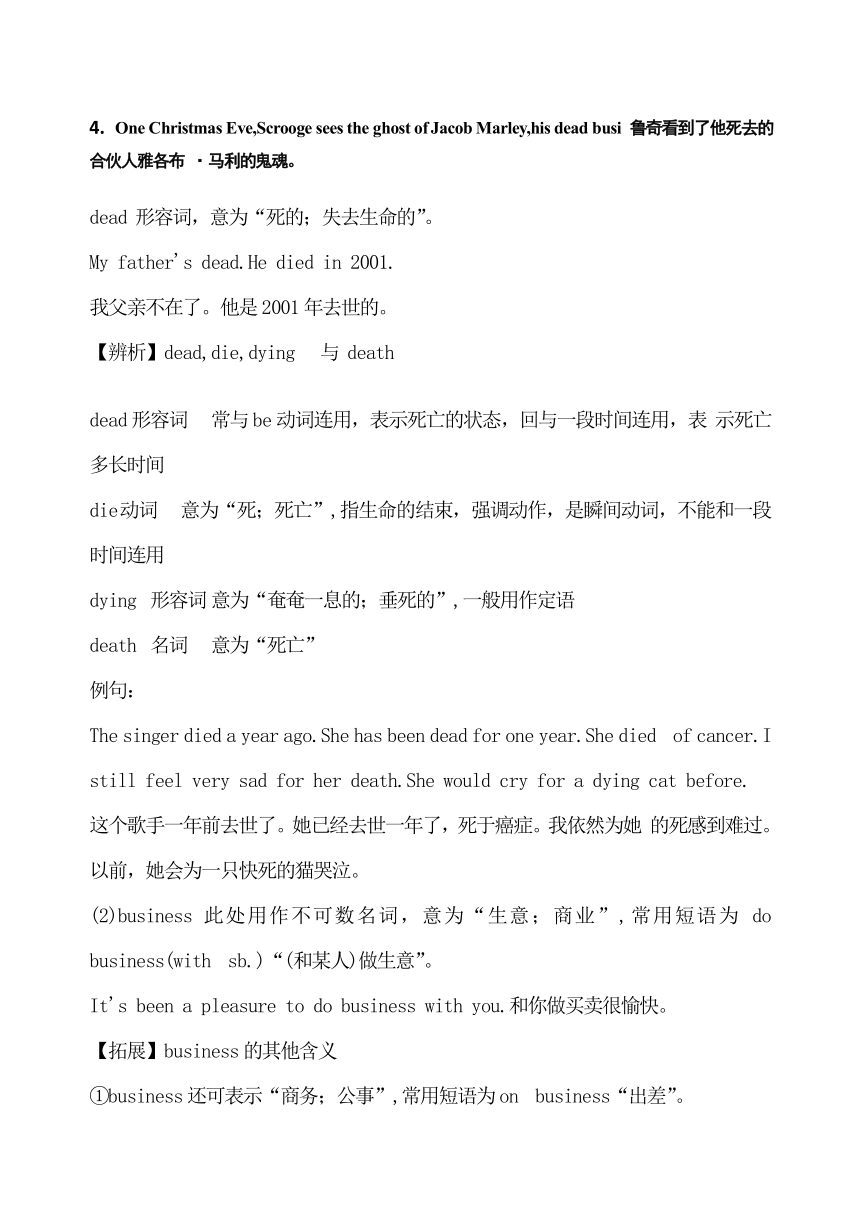Unit 2 I think that mooncakes are delicious! Section B 知识点详解 2024-2025学年人教版九年级英语全册
文档属性
| 名称 | Unit 2 I think that mooncakes are delicious! Section B 知识点详解 2024-2025学年人教版九年级英语全册 |

|
|
| 格式 | docx | ||
| 文件大小 | 25.4KB | ||
| 资源类型 | 教案 | ||
| 版本资源 | 人教新目标(Go for it)版 | ||
| 科目 | 英语 | ||
| 更新时间 | 2024-09-03 00:00:00 | ||
图片预览




文档简介
Unit 2
I think that mooncakes are delicious!
重点单词
haunted adj.有鬼魂出没的;闹鬼的
2. ghost n.鬼;鬼魂
3. trick n.花招;把戏 搭配:Trick or Treat 不请吃就捣蛋
4.treat n.款待;招待v. 招待;请(客)
搭配:treat sb. 招待;请客
5.spider n.蜘蛛 拓展:Spider-Man《蜘蛛侠》
6.Christmas n.圣诞节 搭配:Merry Christmas!圣诞快乐!
7.lie v.(lay ,lain )存在;平躺;处于 拓展:lie说谎
8.novel n. (长篇)小说
9. eve n.前夕;前夜 搭配:Christmas Eve平安夜
10.dead adj. 死的;失去生命的
联想:die v.死;死亡 death n.死;死亡
11.business n. 生意;商业 拓展:businessman n.商人;企业家
12.punish v. 处罚;惩罚 拓展:punishment n.处罚;惩罚
13.warn v. 警告;告诫 拓展:warning n.警告;警示
14.end up最终成为;最后处于
15.present n. 现在;礼物adj. 现在的 搭配:at present目前
16.warmth n. 温暖;暖和
17.spread v.(spread,spread) 传播;展 n. 蔓延;传播
知识点睛
“Trick or treat”
(1)treat用作名词,意为“款待;招待”。treat 还可作动词,意为“招待;请
(客)”,常构成短语:treat sb.to sth“请某人吃某物”。
This is my treat.这次我请客。
【拓展】treat作动词的其他用法
①treat意为“看待;当作”,常与as 连用构成短语treat ...as ...,意为 “把……看作……”。
Don't treat me as a child.别把我当作孩子对待。
②treat意为“治疗”。
Which doctors are treating her for her illness 哪几位医生正在为她治病
(2)if意为“如果”,此处用于引导条件状语从句,主句是一般将来时,从句 常用一般现在时。
If you don't believe in yourself,who will 如果你都不相信自己,那么谁还会呢
【拓展】
if引导宾语从句时,意为“是否”,相当于whether。如果主句是一般现在 时,从句须根据实际情况确定时态。
I want to know if/whether it will rain tomorrow. 我想知道明天是否会下雨。
But behind all these things lies the true meaning of Christmas:the importance of sharing and giving love and joy to people around us.但是在这一切背后存在着圣诞节的真谛:分享与给予我们周围的人爱与欢乐的重要
(1)lie 不及物动词,意为“存在;在于”,主要指思想、 特征、问题等。
The problem lies in their method.问题在于他们的方式。
(2)share作动词,意为“分享;合用;分担”,常与with、among、between、 in 连用。
I shared my lunch with him.我与他分享我的午饭。
We share a small room between us.我们俩合用一个小房间
巧记 lie 多重含义
The man lying there lies that he laid the money on the table.
躺在那里的人撒谎说,他把钱放 在桌子上了。
He is mean and only thinks about himself.他吝啬,只考虑自己。
mean 此处用作形容词,意为“吝啬的;刻薄的”。
Don't be so mean to your little brother.别对你弟弟那么刻薄。
【拓展】mean 的其他用法
①mean 作动词,意为“意味着;作……解释;……的意思”。mean to do 表 示“打算做…… ”;mean doing 表示“意味着……。
We mean to visit you tomorrow.我们打算明天看望你。
Success means working hard.成功意味着工作努力。
②mean 的名词形式是meaning, 意为“意思;含义”,常构成短语 the meaning of ...,意为“……的意思”。
What does this word mean =What's the meaning of this word 这个单词是什么意思
One Christmas Eve,Scrooge sees the ghost of Jacob Marley,his dead busi 鲁奇看到了他死去的合伙人雅各布 · 马利的鬼魂。
dead 形容词,意为“死的;失去生命的”。
My father's dead.He died in 2001.
我父亲不在了。他是2001年去世的。
【辨析】dead,die,dying 与 death
dead形容词 常与be动词连用,表示死亡的状态,回与一段时间连用,表 示死亡多长时间
die 动词 意为“死;死亡”,指生命的结束,强调动作,是瞬间动词,不能和一段时间连用
dying 形容词 意为“奄奄一息的;垂死的”,一般用作定语
death 名词 意为“死亡”
例句:
The singer died a year ago.She has been dead for one year.She died of cancer.I still feel very sad for her death.She would cry for a dying cat before.
这个歌手一年前去世了。她已经去世一年了,死于癌症。我依然为她 的死感到难过。以前,她会为一只快死的猫哭泣。
(2)business 此处用作不可数名词,意为“生意;商业”,常用短语为 do business(with sb.)“(和某人)做生意”。
It's been a pleasure to do business with you.和你做买卖很愉快。
【拓展】business的其他含义
①business还可表示“商务;公事”,常用短语为on business“出差”。
His father has gone to Nanjing on business.他父亲去南京出差了。
② business 还可表示“归(某人或某机构)管的事;职责”。
This is none of your business.这与你无关。
Marley used to be just like Scrooge,so he was punished after he died. 死后受到了惩罚。
(1)used to意为“过去常常”,后接动词原形,表示过去的动作或状态。be used to doing sth.意为“习惯于做某事”。
My father used to go to work by car,but now he is used to walking to work.
我的爸爸过去常常开车去上班,但是现在他习惯于步行去上班。
punish 及物动词,意为“处罚;惩罚”,
其常用结构为:
punish sb.for (doing)sth.因(做)某事而惩罚某人
punish(sb.)with/by (doing)sth.通过(做)某事来惩罚(某人)
be punished for..由于……而受到惩罚
He was punished for refusing to answer their questions 他拒绝回答他们的问题,因此受到了惩罚。
The mother punished her child by not allowing him to go out. 这位母亲处罚她的孩子,不准他出去。
The driver was punished for drunk driving. 这名司机因酒驾而受到了惩罚。
He warns Scrooge to change his ways if he doesn't want to end up like him 上自己的老路,就要改变生活方式。
(1)warn 及物动词,意为“警告;告诫”,常用于以下结构:
warn sb.(not)to do sth.意为“告诫某人(不要)做某事”
Warn sb.about sth.意为“提醒某人注意某事”
warrn sb.of /against (doing) sth.意为“告诫某人当心提防(做)某事”
He warned her to keep silent.他告诚她保持沉默。
She warned us about the serious situation 她提醒我们注意形势的严峻性。
They warned me against swimming in that part of the river. 他们告诚我不要在河的那一带游泳。
(2)end up意为“最终成为;最后处于;结束”,常用结构为:
①end up doing sth.表示“以做某事结束”,此处动词-ing 形式作宾语。
②end up with表示“以……结束”,其后接名词。
The party ended up singing an English song.
聚会以唱一首英文歌而结束。
If you do that,you'll end up with egg on your face.
你要是那样做,将会出洋相。
He also tells Scronge to expect three spirits to visit him.
expect 用作动词,意为“期待;预料”,后接名词、代词、动词不定式或从句。 常用结构为:
Expect to do sth.期待做某事
expect sb.to do sth.期待某人做某事
expect+that从句期望……
I expect a letter from my family.我期待一封家信。
She expects to come back next week.她期待下个星期回来。
Don't expect him to show kindness to you.别指望他会对你发善心。
I expect that I will get good grades this term 我期望这学期我会取得好成绩。
First,the Ghost of Christmas Past takes him back to his childhood and remind as a child.
(1)take sb.back to ... 表示“带某人回到……”,后接时间名词或地点
名词。
The song took me back to my childhood. 这首歌把我带回了我的童年时代。
I will take you back to France next week.下周我将带你回法国。
remind 动词,意为“提醒;使记起;使想起”,
常用搭配有:
remind sb.of sb.sth.意为“使某人想起某人某事”
remind sb.to do sth.意为“提醒某人做某事”
remind+sb.+that从句意为“提醒某人…… ”
例句:
The pictures remind me of my schooldays. 这些照片使我想起了我的学生时代。
My parents often remind me to study hard. 我父母经常提醒我要努力学习。
I remind him that he must go home before dark. 我提醒他必须在天黑之前回家。
Then the second spirit,the Ghost of Christmas Present,takes him to see
present 此处作名词,意为“现在”,
常用短语为at present“目前;现在”。
I don't need the dictionary at present.我现在不需要这本词典。
【拓展】present的其他用法
①present 作名词,还可表示“礼物”。
Here's my New Year present to you. 这是我送给你的新年礼物。
②present 还可作形容词,意为“现在的”。
We don't have any more information at the present time. 目前我们没有进一步的消息。
10.He decides to change his life and promises to be a better person.
promise 作动词,意为“允诺;答应”。
其常用结构有:
promise sb.sth.答应某人某事
promise promise to do sth.承诺答应做某事
promise sb.(not)to do sth.承诺/答应某人(不)做某事
promise+that从句承诺……
例句:
He promised me the book.他答应给我这本书。
He promised to help us.他答应要帮助我们。
I promise you not to say that.我答应你不说那件事。
【拓展】promise作名词构成的常用短语
①make a promise许下诺言
②keep one's promise信守诺言
③break one's promise失信;不守承诺
11.He now treats everyone with kindness and warmth, spreading love and joy
(1)warmth 意为“温暖;热情”,是形容词warm 的名词形式。
He was pleased by the warmth of their welcome.
他因受到他们的热烈欢迎而高兴。
(2)spreading love and joy是动词-ing短语作伴随状语,说明谓语部分 “treats everyone.”发生时,另一个动作也在伴随着发生。spread 动词, 意为“传播;展开”。
He tried to swim in the water,crying for help.
他尽力在水中游着,呼喊着救命。
The news spread through the school very quickly.
那个消息很快就传遍了整个学校。
I think that mooncakes are delicious!
重点单词
haunted adj.有鬼魂出没的;闹鬼的
2. ghost n.鬼;鬼魂
3. trick n.花招;把戏 搭配:Trick or Treat 不请吃就捣蛋
4.treat n.款待;招待v. 招待;请(客)
搭配:treat sb. 招待;请客
5.spider n.蜘蛛 拓展:Spider-Man《蜘蛛侠》
6.Christmas n.圣诞节 搭配:Merry Christmas!圣诞快乐!
7.lie v.(lay ,lain )存在;平躺;处于 拓展:lie说谎
8.novel n. (长篇)小说
9. eve n.前夕;前夜 搭配:Christmas Eve平安夜
10.dead adj. 死的;失去生命的
联想:die v.死;死亡 death n.死;死亡
11.business n. 生意;商业 拓展:businessman n.商人;企业家
12.punish v. 处罚;惩罚 拓展:punishment n.处罚;惩罚
13.warn v. 警告;告诫 拓展:warning n.警告;警示
14.end up最终成为;最后处于
15.present n. 现在;礼物adj. 现在的 搭配:at present目前
16.warmth n. 温暖;暖和
17.spread v.(spread,spread) 传播;展 n. 蔓延;传播
知识点睛
“Trick or treat”
(1)treat用作名词,意为“款待;招待”。treat 还可作动词,意为“招待;请
(客)”,常构成短语:treat sb.to sth“请某人吃某物”。
This is my treat.这次我请客。
【拓展】treat作动词的其他用法
①treat意为“看待;当作”,常与as 连用构成短语treat ...as ...,意为 “把……看作……”。
Don't treat me as a child.别把我当作孩子对待。
②treat意为“治疗”。
Which doctors are treating her for her illness 哪几位医生正在为她治病
(2)if意为“如果”,此处用于引导条件状语从句,主句是一般将来时,从句 常用一般现在时。
If you don't believe in yourself,who will 如果你都不相信自己,那么谁还会呢
【拓展】
if引导宾语从句时,意为“是否”,相当于whether。如果主句是一般现在 时,从句须根据实际情况确定时态。
I want to know if/whether it will rain tomorrow. 我想知道明天是否会下雨。
But behind all these things lies the true meaning of Christmas:the importance of sharing and giving love and joy to people around us.但是在这一切背后存在着圣诞节的真谛:分享与给予我们周围的人爱与欢乐的重要
(1)lie 不及物动词,意为“存在;在于”,主要指思想、 特征、问题等。
The problem lies in their method.问题在于他们的方式。
(2)share作动词,意为“分享;合用;分担”,常与with、among、between、 in 连用。
I shared my lunch with him.我与他分享我的午饭。
We share a small room between us.我们俩合用一个小房间
巧记 lie 多重含义
The man lying there lies that he laid the money on the table.
躺在那里的人撒谎说,他把钱放 在桌子上了。
He is mean and only thinks about himself.他吝啬,只考虑自己。
mean 此处用作形容词,意为“吝啬的;刻薄的”。
Don't be so mean to your little brother.别对你弟弟那么刻薄。
【拓展】mean 的其他用法
①mean 作动词,意为“意味着;作……解释;……的意思”。mean to do 表 示“打算做…… ”;mean doing 表示“意味着……。
We mean to visit you tomorrow.我们打算明天看望你。
Success means working hard.成功意味着工作努力。
②mean 的名词形式是meaning, 意为“意思;含义”,常构成短语 the meaning of ...,意为“……的意思”。
What does this word mean =What's the meaning of this word 这个单词是什么意思
One Christmas Eve,Scrooge sees the ghost of Jacob Marley,his dead busi 鲁奇看到了他死去的合伙人雅各布 · 马利的鬼魂。
dead 形容词,意为“死的;失去生命的”。
My father's dead.He died in 2001.
我父亲不在了。他是2001年去世的。
【辨析】dead,die,dying 与 death
dead形容词 常与be动词连用,表示死亡的状态,回与一段时间连用,表 示死亡多长时间
die 动词 意为“死;死亡”,指生命的结束,强调动作,是瞬间动词,不能和一段时间连用
dying 形容词 意为“奄奄一息的;垂死的”,一般用作定语
death 名词 意为“死亡”
例句:
The singer died a year ago.She has been dead for one year.She died of cancer.I still feel very sad for her death.She would cry for a dying cat before.
这个歌手一年前去世了。她已经去世一年了,死于癌症。我依然为她 的死感到难过。以前,她会为一只快死的猫哭泣。
(2)business 此处用作不可数名词,意为“生意;商业”,常用短语为 do business(with sb.)“(和某人)做生意”。
It's been a pleasure to do business with you.和你做买卖很愉快。
【拓展】business的其他含义
①business还可表示“商务;公事”,常用短语为on business“出差”。
His father has gone to Nanjing on business.他父亲去南京出差了。
② business 还可表示“归(某人或某机构)管的事;职责”。
This is none of your business.这与你无关。
Marley used to be just like Scrooge,so he was punished after he died. 死后受到了惩罚。
(1)used to意为“过去常常”,后接动词原形,表示过去的动作或状态。be used to doing sth.意为“习惯于做某事”。
My father used to go to work by car,but now he is used to walking to work.
我的爸爸过去常常开车去上班,但是现在他习惯于步行去上班。
punish 及物动词,意为“处罚;惩罚”,
其常用结构为:
punish sb.for (doing)sth.因(做)某事而惩罚某人
punish(sb.)with/by (doing)sth.通过(做)某事来惩罚(某人)
be punished for..由于……而受到惩罚
He was punished for refusing to answer their questions 他拒绝回答他们的问题,因此受到了惩罚。
The mother punished her child by not allowing him to go out. 这位母亲处罚她的孩子,不准他出去。
The driver was punished for drunk driving. 这名司机因酒驾而受到了惩罚。
He warns Scrooge to change his ways if he doesn't want to end up like him 上自己的老路,就要改变生活方式。
(1)warn 及物动词,意为“警告;告诫”,常用于以下结构:
warn sb.(not)to do sth.意为“告诫某人(不要)做某事”
Warn sb.about sth.意为“提醒某人注意某事”
warrn sb.of /against (doing) sth.意为“告诫某人当心提防(做)某事”
He warned her to keep silent.他告诚她保持沉默。
She warned us about the serious situation 她提醒我们注意形势的严峻性。
They warned me against swimming in that part of the river. 他们告诚我不要在河的那一带游泳。
(2)end up意为“最终成为;最后处于;结束”,常用结构为:
①end up doing sth.表示“以做某事结束”,此处动词-ing 形式作宾语。
②end up with表示“以……结束”,其后接名词。
The party ended up singing an English song.
聚会以唱一首英文歌而结束。
If you do that,you'll end up with egg on your face.
你要是那样做,将会出洋相。
He also tells Scronge to expect three spirits to visit him.
expect 用作动词,意为“期待;预料”,后接名词、代词、动词不定式或从句。 常用结构为:
Expect to do sth.期待做某事
expect sb.to do sth.期待某人做某事
expect+that从句期望……
I expect a letter from my family.我期待一封家信。
She expects to come back next week.她期待下个星期回来。
Don't expect him to show kindness to you.别指望他会对你发善心。
I expect that I will get good grades this term 我期望这学期我会取得好成绩。
First,the Ghost of Christmas Past takes him back to his childhood and remind as a child.
(1)take sb.back to ... 表示“带某人回到……”,后接时间名词或地点
名词。
The song took me back to my childhood. 这首歌把我带回了我的童年时代。
I will take you back to France next week.下周我将带你回法国。
remind 动词,意为“提醒;使记起;使想起”,
常用搭配有:
remind sb.of sb.sth.意为“使某人想起某人某事”
remind sb.to do sth.意为“提醒某人做某事”
remind+sb.+that从句意为“提醒某人…… ”
例句:
The pictures remind me of my schooldays. 这些照片使我想起了我的学生时代。
My parents often remind me to study hard. 我父母经常提醒我要努力学习。
I remind him that he must go home before dark. 我提醒他必须在天黑之前回家。
Then the second spirit,the Ghost of Christmas Present,takes him to see
present 此处作名词,意为“现在”,
常用短语为at present“目前;现在”。
I don't need the dictionary at present.我现在不需要这本词典。
【拓展】present的其他用法
①present 作名词,还可表示“礼物”。
Here's my New Year present to you. 这是我送给你的新年礼物。
②present 还可作形容词,意为“现在的”。
We don't have any more information at the present time. 目前我们没有进一步的消息。
10.He decides to change his life and promises to be a better person.
promise 作动词,意为“允诺;答应”。
其常用结构有:
promise sb.sth.答应某人某事
promise promise to do sth.承诺答应做某事
promise sb.(not)to do sth.承诺/答应某人(不)做某事
promise+that从句承诺……
例句:
He promised me the book.他答应给我这本书。
He promised to help us.他答应要帮助我们。
I promise you not to say that.我答应你不说那件事。
【拓展】promise作名词构成的常用短语
①make a promise许下诺言
②keep one's promise信守诺言
③break one's promise失信;不守承诺
11.He now treats everyone with kindness and warmth, spreading love and joy
(1)warmth 意为“温暖;热情”,是形容词warm 的名词形式。
He was pleased by the warmth of their welcome.
他因受到他们的热烈欢迎而高兴。
(2)spreading love and joy是动词-ing短语作伴随状语,说明谓语部分 “treats everyone.”发生时,另一个动作也在伴随着发生。spread 动词, 意为“传播;展开”。
He tried to swim in the water,crying for help.
他尽力在水中游着,呼喊着救命。
The news spread through the school very quickly.
那个消息很快就传遍了整个学校。
同课章节目录
- Unit 1 How can we become good learners.
- Section A
- Section B
- Unit 2 I think that mooncakes are delicious!
- Section A
- Section B
- Unit 3 Could you please tell me where the restroom
- Section A
- Section B
- Unit 4 I used to be afraid of the dark.
- Section A
- Section B
- Unit 5 What are the shirts made of?
- Section A
- Section B
- Review of Units 1-5
- Unit 6 When was it invented?
- Section A
- Section B
- Unit 7 Teenagers should be allowed to choose their
- Section A
- Section B
- Unit 8 It must belong to Carla.
- Section A
- Section B
- Unit 9 I like music that I can dance to.
- Section A
- Section B
- Unit 10 You're supposed to shake hands.
- Section A
- Section B
- Review of Units 6-10
- Unit 11 Sad movies make me cry.
- Section A
- Section B
- Unit 12 Life is full of the unexpected
- Section A
- Section B
- Unit 13 We're trying to save the earth!
- Section A
- Section B
- Unit 14 I remember meeting all of you in Grade 7.
- Section A
- Section B
- Review of Units 11-14
